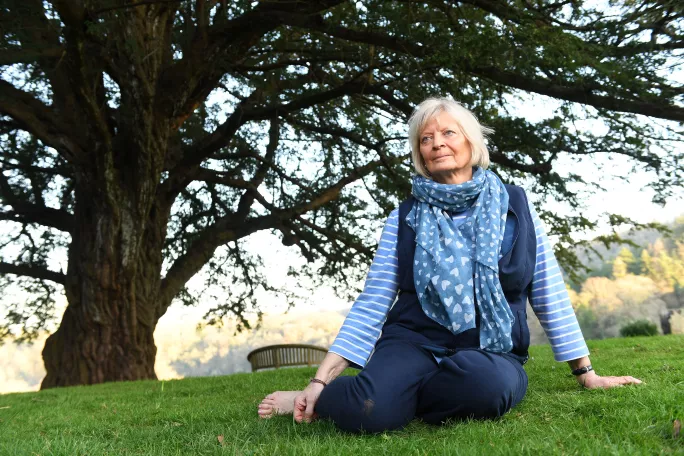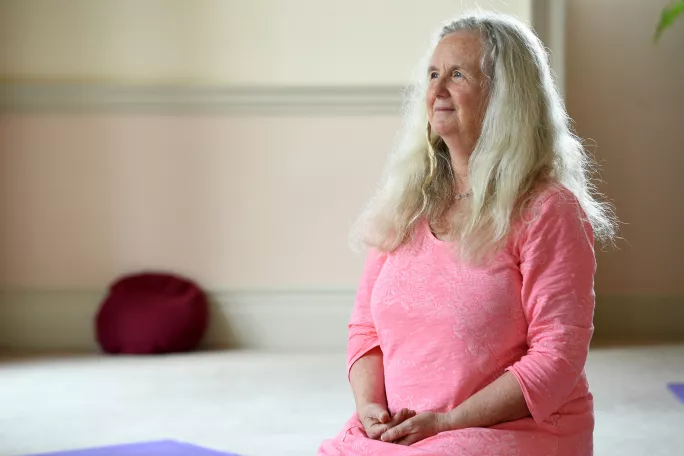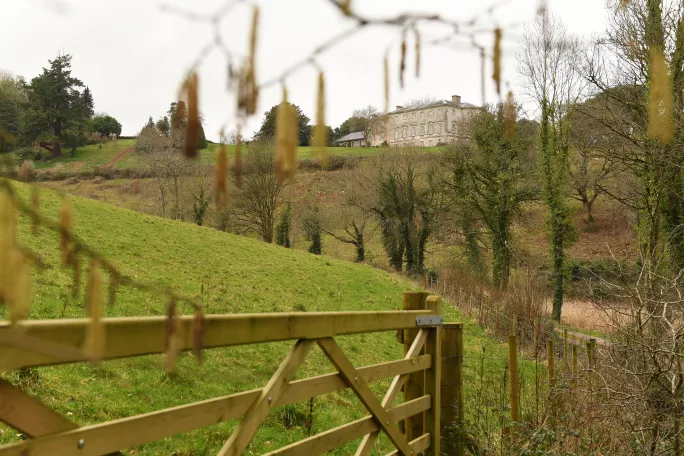- Home
- Welcome to the mindfulness retreat for burned-out teachers
Welcome to the mindfulness retreat for burned-out teachers

On the grassy banks of the Pool of Tranquillity, just out of sight of a grand Devon manor house, a small group of teachers sits in silence.
They do not come from the same school, nor do they teach the same subject, but they do have one thing that unites them: they have all decided to attend one of the increasingly common mindfulness retreats specifically designed for burned-out teachers.
When I first saw the advert for the “Sustaining Our Teachers” retreat at Sharpham House in Totnes, I was shocked. As an ex-teacher, I know firsthand how stressful the job can be. But were things really this bad?
Quick read: An interview with Professor Willem Kuyken
Quick listen: What is character education, and does it work?
Want to know more? The Mindfulness in Schools Project
I did a cursory search on Google and found other retreats designed specifically for teachers. I found nothing similar for other professions. Clearly, things are this bad.
The research backs this up. Stress in teaching is seemingly worse than in other professions, according to recent NFER research. Statistically, teachers are more likely to be working longer hours, and to be feeling stressed and anxious about their job.
Meanwhile, figures obtained via a freedom of information request in January last year estimated 3,750 teachers are signed off with stress. For the teachers who stay in the classroom, the Education Support Partnership compiled the Teacher Wellbeing Index and recorded rising numbers of teachers who were reporting insomnia, mood swings and tearfulness.
Mindfulness intervention
And mindfulness has quickly become one of the go-to solutions for teacher stress. Schools have been keen to try and use its principles with pupils in the hope that it will improve the mental health of the children in their care.
We’re now seeing the focus shift to the teachers, with after-school yoga and meditation days becoming more popular (see the 3 May issue of Tes for an explanation as to why this is very problematic and could possibly do more harm than good).
But dedicated retreats seems a huge shift up: was this something schools were paying for? Were teachers attending as a preventative measure? Was this something they hoped would get them back into the classroom, or was it something to help them recover and then they would leave education behind?
Retreat to the country
In search of answers, I arrived at Sharpham House one chilly February evening and came across the small group by the Pool of Tranquillity.

Sharpham House has been running mindfulness retreats for many years now, but this February half term was the first time they had offered one specifically for burned-out teachers.
For five days, teachers practised mindful sitting, eating, and walking in the Devon countryside, with two experienced mindfulness teachers leading the course.
It cost between £375-£450, and they got full board and food, too.
Teacher-only benefits
Course tutor Professor Katherine Weare says that tailoring a retreat for teachers seemed a sensible move because it allowed guests to speak freely about their job in the knowledge that the others in the group would understand.
“We’ve run other mindfulness courses in the past that have been attended by teachers, but what we were able to do on this retreat was discuss school-related issues that were causing stress and anxiety,” she explains.
“We were able to give practical solutions without having to wade through the illusion that teachers have an easy job with lots of lovely holidays. Instead, they were able to discuss Ofsted, low-level disruption and marking pressures with people who had a shared understanding of what that meant.

“The teachers on the retreat commented that they found that aspect quite relaxing and reassuring.”
She adds that it allowed teachers to focus on useful work-related strategies that would benefit the whole group.
“We were discussing marking in the group, and strategies to make marking less of a burden,” she recalls. “And out of the discussion, we discussed visualising the child when you come to mark their book, so that you think of that piece of paper as the person, and you’re communicating with them personally. And that seemed to help - thinking of the whole class and reminding yourself of the human side of the task.”
Frequent visitors
While mingling with the attendees, I discovered that it wasn’t just teachers at the brink of quitting who were in attendance; neither was it just those already signed off with stress. Those teachers were certainly there, but others were seeking protection against burnout.

Jacquie Allen, an FE maths teacher, was one. She explains that she attends retreats like this as an investment in herself.
“I have friends who are burned out, and their stories are so sad,” she says. “Weaker teachers become prey. They get targeted, they get observed, they get told they need to improve - and they end up getting kicked out of teaching.”
Protection process
Allen believes the retreats ensure she is mentally strong enough to cope with the stresses of teaching.
“I’ve always taken time out for myself, because teaching is a job where you’re constantly communicating with people, and there’s an awful lot of pressure on you to be available. It is a pressurised job, and people are leaving in huge numbers.
“But here am I after 25 years, and I’m still happy and enjoying my job. And part of that is because I’ve recognised that I really do need to take some time for myself.”
Another attendee, secondary EAL teacher Thanos Hartavellas, is of a similar view and has been a mindfulness devotee throughout his teaching career.
“I think, as teachers, whatever we do to develop ourselves has an impact on the job we’re doing,” he says. “So if we’re growing as human beings, this is bound to have an impact in the classroom. You can’t offer something you don’t have; by practising self-compassion, you develop resources that you can use afterwards.”

For understandable reasons, most of these teachers who came to the retreat because they were experiencing extremely high levels of stress preferred not to talk about their experience at the time. However, after the retreat, one of the attendees, primary teacher Lucy Unocher, did agree to reflect on the experience and on why she went there.
“I’ve found working in schools can be so challenging,” she says. “The needs and demands of others place a heavy load on teachers’ shoulders, and my self-determined drive to do the very best possible job, however difficult the circumstances, is at times utterly exhausting.”
Common problem
She says she is not alone in feeling this way.
“Over 25 years, I have seen many colleagues - in different schools, at different stages in their careers and for different reasons - struggling to keep their heads above the water, and some going under,” she reveals. “Part of the problem is that we’re not always good at looking after our own wellbeing. Physical, emotional and mental health are inextricably linked and we often neglect all of these. Schools as a workplace can definitely be toxic for our mental health.”
She says the retreat helped, and that she was pleased she attended.

“One day during the retreat, a poem read aloud by one of the facilitators at the close of a meditation touched me deeply and opened the floodgates of some long-suppressed emotions. I cried a lot!” she says. “The staff, retreat leaders and other retreatants were all understanding and supportive in just the right way for me at the time.
“Sharpham was a safe place to allow and let go of some difficult feelings. I know some other members of the group experienced similar times during the retreat, and were grateful.”
Mindfulness by rote
There is strong evidence that mindfulness, when delivered properly by professionals over a sustained period of time, is highly effective in reducing stress, anxiety and depression.

“Mindfulness has a good track record for helping people who are feeling a bit stressed, and want to get a better handle on things,” says Tamsin Ford, professor of child and adolescent psychiatry at the University of Exeter. “However, as with anything, it is continuing the regular practice that will make it effective.”
And all the teachers I spoke to shared Unocher’s view that the retreat specifically for teachers was beneficial.
“I’ve done lots of retreats, but what is so good about this retreat for teachers is that it is so practical; there are lots of mindful practices that we can use in schools,” Allen explains.
Growing provision
Weare says that, following the success, Sharpham hopes to hold more of the courses in the future.
“The teachers who attended the teacher mindfulness course loved it, and the evaluations we had back were incredibly positive,” she says. “What we’re hoping to do is run more retreats, and to make more links with other teacher development organisations, and try to get more senior leaders on our retreats, as well as classroom teachers.”
It’s likely that, given the success of this retreat, more retreats will pop up around the country, too.
Which raises an important issue: these retreats are a substantial financial outlay and at present, teachers pay for themselves to attend. Because it is self-funded, there will inevitably be accusations that these retreats are exploiting vulnerable and stressed teachers for financial gain.
Finance questions
Weare says that could not be further from the truth.
“Sharpham is a charity, and our retreat for teachers didn’t break even,” she reveals. “Our [course] teachers work for half of what they could work for - we do it because we love it. I enjoy teaching people a practical skill, and it is satisfying helping people with mindfulness because they really appreciate it.
“People arrive all stressed out and miserable, and then they leave with useful skills under their belt and they look six inches taller because they’ve got their breath back - and that is so satisfying for me as their teacher.”
But she does think teachers should not be the ones forking out. In her view, schools should be contributing to the cost of interventions like this.
“Schools are so up against it when it comes to budget cuts, but if schools can find the money, then contributions or part-funding is worth exploring,” she suggests. “Especially when you think about the cost of supply teachers, and covering long-term absence of sick teachers.”

Allen agrees: “It would be a good investment for schools to pay for teachers to go on retreats like this. I’m fortunate that my children are grown up and I can afford this, but in the past I have made sacrifices so that I can attend retreats because I can see it is important. At the end of the day, we need to do something to help teachers to be able to cope with the stress of the job.”
School responsibility?
Is this likely to happen? As part of a return-to-work process or in certain safeguarding situations, it may be feasible, but this is unlikely to become a large-scale solution in education. There simply is not the money to facilitate it.
What it should be is a wake-up call for how bad things have got. As Allen says, we need to recognise what the system is doing to teachers and take action.
“We need a kinder system where teachers are not being worked in a completely crazy way,” she says. “Teachers should be taken care of.”
In the 3 May issue of Tes, there is an investigation into mindfulness interventions for teachers in schools - do they work? Are schools getting it right? Could they even make things worse? Find out in the magazine - you can subscribe here
Keep reading for just £1 per month
You've reached your limit of free articles this month. Subscribe for £1 per month for three months and get:
- Unlimited access to all Tes magazine content
- Exclusive subscriber-only stories
- Award-winning email newsletters



